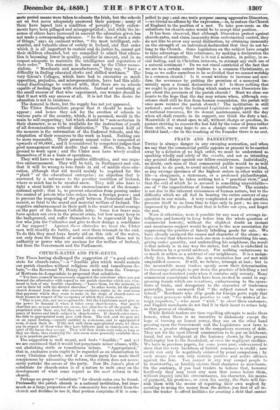CM:MPH-RATES AND PEW-RENTS.
THE Times having challenged the suggestion of "a good substi- stute for church-rates,"—a "feasible plan which would sustain our parish churches without religious strife and tumultuous de- bate,"—the Reverend W. Henry Jones writes from the Vicarage of lefottram-in-Longendale to propound that substitute.
"You have yourself unconsciously suggested the substitute when you put forward the alternative with regard to our parish churches which you com- mend in lack of any feasible expedient,—' Leave them, for the moment, to cast in their lot with the district churches.' In other words, let the parish church demand from those who exercise exclusive rights in its seat-room that payment which they cease to make in the shape of church-rates on their houses in respect of the occupancy of which they elaim seats.
"This is just, fair, and unexceptionable. But the Legislature must give us the power to demand it when it takes away church-rates. Our with churches are, as your readers are aware, free churches to all the parish. Ap- propriated seats there are, but they are held in connexion with the occu- pancy of houses and lands subject to church-rates. If church-rates cease, the title to appropriated seats goes with them. The rich and the poor are on an equal footing,—equally entitled to seat-room, and to appropriated seats, if such there be. If the rich still claim appropriated seats, let them pay in respect of these what they have hitherto paid in church-rate in re- spect of the house they occupy. They will then retain seats only as long as they use them, thus rendering the seat-room more generally available than it is in popnlons.parishes."
The suggestion is well meant, and looks " feasible ; " and yet we are convinced that it-would but perpetuate minor abuses, with- out abolishing strife or tumultuous debate. "Appropriated," that is, exclusive seats ought to be regarded as an abomination in every Christian church ; and if a certain party has made itself conspicuous by advocating the reform, the reform does not neces- sarily partake the errors of the party. Now Mr. Jones's plan of substitute for church-rates is of a nature to melt away on the development of what some regard as the next reform in the church.
Perhaps no proper " substitute" for church-rates can be found. Profmedly the parish church is a national institution, but inas- much es a large proportion of the community has seceded from the church and declines to use it, that portion complains if it is com-
pelled to pay ; and one main purpose among aggressive Dissenters, —we iiltend no offence by the expression,—is, to reduce the Church of England to the position of a sect. To take pew-rents as the substitute for church-rates would be to accept that position. It has been observed, that although Dissenters protest against church-rates, and claim immunity from ecclesiastical control, they do not like to avow any social distinction, by obtaining immunity
long to trenturch. Some legislators on the subject have sought
on the s of an individual declaration that they do not be-
te take advantage of this reluctance, by making a declaration the condition of immunity. But is it not a mistake, in policy, in so- cial feeling, and in Christian interests, to attempt any such use of a natural sentiment ? Do we not stand convicted of the fact that we are to a certain eitent traitors to a common Christianity, so long as we suffer ourselves to be so divided that we cannot worship in a common church ? Is it sound wisdom to increase and con- firm the severance by putting the premium of a moneyed im- munity upon a formal declaration of it ? Is there nothing that we ought to prize in the feeling which makes even Dissenters lin- ger about the precincts of the parish church ? Must we close our hearts to the hope that the day may return when, although con- science shall still be free from.human compulsion, the parish will once more reenter the parish church ? The institution is still national ; and surely the national Legislature might provide, out of national resources, for its decent maintenance, until the day when all shall reunite in its support, nor think the duty a tax. Meanwhile if it stand open to all, without charge or question, its pastors striving to recover the lost fold by the voice of peace rather than strife, we may hope to see a change come over this sect- divided land,-for in the teaching of the Founder there is no sect.






























 Previous page
Previous page